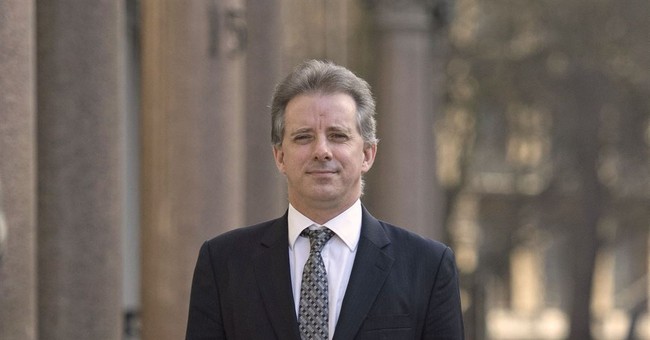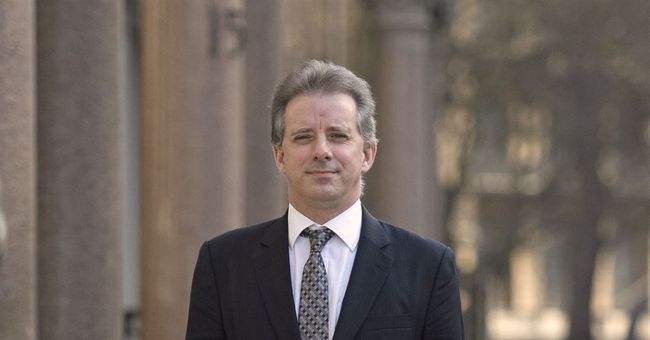
Another part of Christopher Steele’s infamous dossier has just went down the crapper.
British ex-spy Christopher Steele must pay damages to two Alfa Bank partners for publishing “inaccurate or misleading” material in his infamous dossier, including claims the banks funneled “illicit cash” to Russian President Vladimir Putin, a British court ruled Wednesday.
Orbis Business Intelligence was ordered to pay 18,000 English pounds, or nearly $23,000, each to Petr Aven and Mikhail Fridman for violating Britain’s Data Protection Act of 1998 and “for the loss of autonomy, distress and reputational damage caused by the breaches of duty,” the court said. The decision, authored by Justice Mark Warby of the High Court of England and Wales, was Steele’s first major court loss.
“This allegation [about the Putin payments] clearly called for closer attention, a more enquiring approach and more energetic checking,” Warby wrote. “Orbis failed to take reasonable steps in this regard, and to that extent, a breach of the Fourth Principle is established.”
The “Fourth Principle” refers to a portion of the law penalizing the dissemination of inaccurate information.
The dossier made additional inaccurate claims, including that the pair provided foreign policy advice to Putin, the judge found.
If you recall, in late October 2016 one of the big news items was that a server from the Russian-owned Alfa Bank was ‘irregularly pinging’ a server in Trump Tower. That story, originating by Franklin Foer at the failed group blog Slate:
The researchers quickly dismissed their initial fear that the logs represented a malware attack. The communication wasn’t the work of bots. The irregular pattern of server lookups actually resembled the pattern of human conversation—conversations that began during office hours in New York and continued during office hours in Moscow. It dawned on the researchers that this wasn’t an attack, but a sustained relationship between a server registered to the Trump Organization and two servers registered to an entity called Alfa Bank.
The researchers had initially stumbled in their diagnosis because of the odd configuration of Trump’s server. “I’ve never seen a server set up like that,” says Christopher Davis, who runs the cybersecurity firm HYAS InfoSec Inc. and won a FBI Director Award for Excellence for his work tracking down the authors of one of the world’s nastiest botnet attacks. “It looked weird, and it didn’t pass the sniff test.” The server was first registered to Trump’s business in 2009 and was set up to run consumer marketing campaigns. It had a history of sending mass emails on behalf of Trump-branded properties and products. Researchers were ultimately convinced that the server indeed belonged to Trump. (Click here to see the server’s registration record.) But now this capacious server handled a strangely small load of traffic, such a small load that it would be hard for a company to justify the expense and trouble it would take to maintain it. “I get more mail in a day than the server handled,” Davis says.
“I’ve never seen a server set up like that.”
That wasn’t the only oddity. When the researchers pinged the server, they received error messages. They concluded that the server was set to accept only incoming communication from a very small handful of IP addresses. A small portion of the logs showed communication with a server belonging to Michigan-based Spectrum Health. (The company said in a statement: “Spectrum Health does not have a relationship with Alfa Bank or any of the Trump organizations. We have concluded a rigorous investigation with both our internal IT security specialists and expert cyber security firms. Our experts have conducted a detailed analysis of the alleged internet traffic and did not find any evidence that it included any actual communications (no emails, chat, text, etc.) between Spectrum Health and Alfa Bank or any of the Trump organizations. While we did find a small number of incoming spam marketing emails, they originated from a digital marketing company, Cendyn, advertising Trump Hotels.”)
Trump-is-getting-orders-from-Russia became a big story.
We now know that the Alfa Bank server story appears to have been pushed on the feckless, credulous Foer by Michael Sussman. Sussman is a partner in Perkins Coie, that would be the law firm that was employed by the Clinton campaign which hired Christopher Steele and marketed his work to Washington political journalists.
As part of the dossier, Steele peddled a story about how two of the banks directors, Petr Aven and Mikhail Fridman, were close friends to Vladimir Putin. The dossier was being briefed to DC media and discussed with the FBI and Department of Justice at the same time and so the Alfa Bank story was given plausibility by the dossier that was endorsed by the FBI.
Aven and Fridman tried to sue Steele in the District of Columbia two years ago and the suit was dismissed because US law is heavily weighted towards allowing speech, and because Aven and Fridman were ruled to be “limited-purpose public figures” by the judge and, therefore, afforded fewer protections as the Alfa Bank story was deemed to be of public interest.
If at first you don’t succeed, seek another venue. So Aven and Fridman trotted off to a court in Britain where the rules are substantially different. The rule there is that your reputation has a value and that defamatory claims made about you must be proven true, it is not incumbent upon the damaged party to prove the falsity of the claims. A little earlier today, a Britsh court ruled that Steele had defamed Aven and Fridman and ordered him to pay damages.
British ex-spy Christopher Steele must pay damages to two Alfa Bank partners for publishing “inaccurate or misleading” material in his infamous dossier, including claims the banks funneled “illicit cash” to Russian President Vladimir Putin, a British court ruled Wednesday.
Orbis Business Intelligence was ordered to pay 18,000 English pounds, or nearly $23,000, each to Petr Aven and Mikhail Fridman for violating Britain’s Data Protection Act of 1998 and “for the loss of autonomy, distress and reputational damage caused by the breaches of duty,” the court said. The decision, authored by Justice Mark Warby of the High Court of England and Wales, was Steele’s first major court loss.
“This allegation [about the Putin payments] clearly called for closer attention, a more enquiring approach and more energetic checking,” Warby wrote. “Orbis failed to take reasonable steps in this regard, and to that extent, a breach of the Fourth Principle is established.”
The “Fourth Principle” refers to a portion of the law penalizing the dissemination of inaccurate information.
The dossier made additional inaccurate claims, including that the pair provided foreign policy advice to Putin, the judge found.
At this point, court losses for Steele are just icing on the cake. His dossier has been revealed to be, if not a fraud made up out of whole cloth, a product of the Russian intelligence services. It is hard to believe that any reputable firm will hire Steele or his company knowing what they know now. For sure, his days as a highly paid FBI asset are over. One hates to be petty about it, but I really hope a lot more people are lining up in British courts to make Steele and others, like Stefan Halper, bleed for the damage they did to our country.


